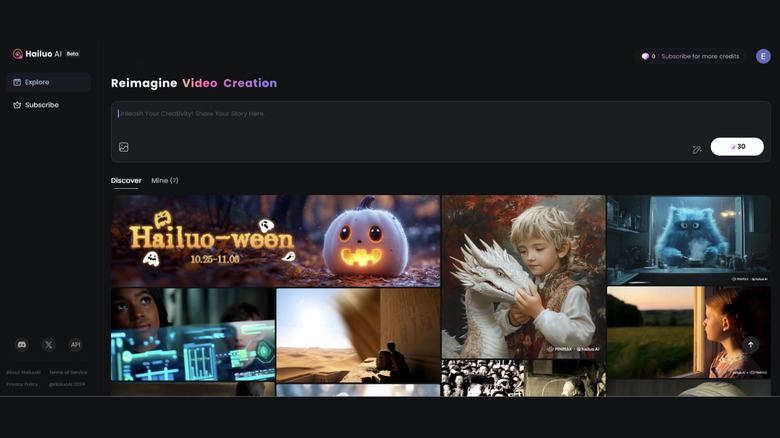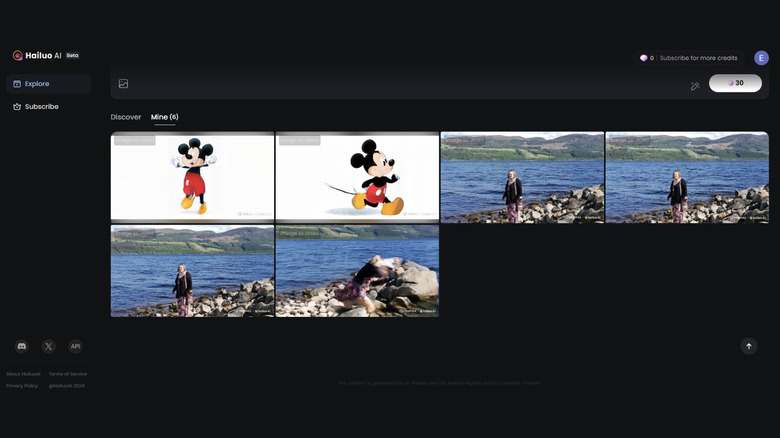What Exactly Is Minimax's Hailuo AI & Is It Safe To Use?
Videos generated by Artificial Intelligence have come a long way in 2024. There are several well-known players in this area, including Synthesia, Runway, and Kling. Minimax threw its computer-generated hat into the ring in September 2024 with its Hailuo AI product, which generates 6-second videos based on a still image, a prompt, or both. Some of the results are still a little shaky. Items appear and disappear with scant regard for continuity, and characters may occasionally defy the laws of physics by passing a hand through a nearby tree or something. That said, the results are otherwise fairly impressive, and they show how fast this technology has progressed in just a few years. What used to take an animation studio months to create can be simulated in just a few minutes on your laptop or phone.
Examples of AI videos abound on social media sites like YouTube, and many users are embracing this new creative medium. However, you might have some reservations about rushing headlong into the uncanny valley of computer-generated video. Here, we'll discuss how Hailuo AI works and whether it's safe for you to use.
What is Hailuo AI?
Hailuo AI is a video generation app produced by Minimax, a Chinese AI company based in Shanghai. Minimax offers several AI products, including chatbots, text-to-speech, and music generation, but it's the photo-to-video model that has captured imaginations online.
You can access it here. Currently, Hailuo AI offers a 2-day free trial with unlimited video generation. After that, you will need to sign up for a plan or accept limited free service.
To create a video, go to the website and upload a photo, type a prompt, or both. Hailuo has a feature called the Prompt Optimizer, which is turned on by default. This feature rewrites your prompt into a more detailed set of instructions for the AI to produce better results. However, it does give Hailuo more creative license, so you might not get the results you were expecting. You can turn the optimizer off so it more closely follows your prompt, but you'll need to make sure you've provided enough information. In testing, I found that producing videos without the optimizer gave choppier and less realistic results compared to the optimized versions, but that's anecdotal.
To create a video, click the button showing a shell icon and credits. The generation of each image can take up to 10 minutes. Once created, you can view your video on the Hailuo AI site or download it as an MP4 file.
How well does Hailuo AI work?
To see how well it worked, I uploaded a picture of myself standing by Loch Ness and gave it a few prompts to work with. Above, you can see what I achieved with the photo and the prompt, "The woman takes off her bag, jumps into the water, and swims away. The camera follows her."
I thought the results were quite impressive once I'd gotten over the shock of seeing myself enter the water in a place that was dry land in real life. Hailuo AI convincingly recreates the movement of my hair and the physics of water ripples. There's a bit of a mystery as to where my bag goes after I've removed it, but if I was less aware of what really happened here, I'd probably believe the veracity of the video. I enjoyed how it accurately captured how ungainly my sprint across the rocks would actually look as well.
My other prompt, "The Loch Ness Monster appears in the water behind the woman, and she screams," wasn't as successful. I was shown screaming before anything happened, and Hailuo didn't do the best job surmising what Nessie looks like.
Hailuo works by combining a large number of technologies. This includes image recognition to determine different elements of an image, like people, water, or fabrics, and 3D modeling algorithms to depict a 2D image in motion. Machine learning techniques and vast amounts of training data enable it to predict and create believable outcomes.
Is Hailuo AI safe to use?
Like most online applications, Minimax collects data like email addresses, location data, and IP addresses. Its privacy policy, which is easily accessible on the Hailuo site, states that it complies with all privacy regulations, including state-specific laws, like those in California and Florida. The website states, "At Hailuo AI Video, we prioritize compliance with these privacy concerns to safeguard our users' data from any unauthorized access or breaches."
However, although Hailuo states that it respects copyright and intellectual property, the system does not prohibit using trademarked images to create videos. I was able to upload a picture of Mickey Mouse and create a video with no problem.
And, of course, all the wider ethical questions about AI video generation apply to Minimax's Hailuo AI, too. Deepfake Taylor Swift images and AI Joe Biden impersonations have already made headlines, and video generation like this could be a tool used by bad actors for dangerous or deceptive ends.
The environmental impact of AI is coming under increasing scrutiny as well. A study by researchers at Hugging Face and Carnegie Mellon University found that generating 1000 AI images produced the same amount of carbon emissions as driving a car for 4 miles and used an average of 2.9kWh in energy. At 25 frames per second, each Hailuo video is the equivalent of 150 AI-generated images. So, while using Hailuo AI video generation might seem safe from a data-security perspective, the bigger picture, in terms of the environment, might have greater implications than we think.


